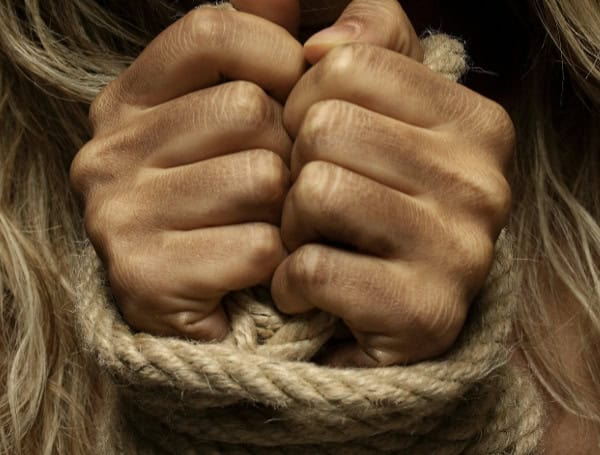Human trafficking is a grave human rights violation that affects countless individuals worldwide, with the United States being no exception. Despite the nation’s efforts to combat this scourge, a troubling reality persists: many victims of human trafficking are themselves criminalized and prosecuted for offenses they were forced to commit by their traffickers.
This unjust practice not only compounds the trauma experienced by these vulnerable individuals but also undermines the very efforts to combat trafficking.
U.S. Senators Marco Rubio (R-FL) and Kirsten Gillibrand (D-NY) introduced the Trafficking Survivors Relief Act Tuesday to allow the criminal records of non-violent trafficking survivors to be expunged.
Read: DOJ: Florida Man Charged With Sex Trafficking Multiple Women, Assaulting Minor In New York
“We can uplift and provide relief to survivors by setting a new federal precedent that would allow them to live a life free from the repercussions of previous offenses incurred through coerced abuse. This important legislation would grant many survivors the opportunity to contribute positively to their communities,” said Senator Rubio.
The Dual Burden of Trafficking Victims
Trafficked persons, particularly those exploited in the sex trade, often find themselves in a cruel catch-22. Forced to engage in illegal activities such as prostitution, they are then arrested and charged with crimes despite being victims themselves.
This paradoxical situation traps them in a vicious cycle, where the very system meant to protect them further victimizes and stigmatizes them.
In most U.S. states, laws and policies are structured to prioritize the arrest and prosecution of individuals involved in prostitution rather than identifying and assisting those who have been trafficked.
As a result, many trafficking victims, including minors under the age of 18, are first encountered by authorities when they are arrested and charged with prostitution-related offenses.
Read: Human Trafficker Who Brought 2 Women From New York To Florida Gets 15 Years In Prison
This traumatic experience only serves to reinforce the fear and distrust of law enforcement that traffickers have instilled in their victims.
“It is absurd for trafficking victims to be charged with crimes they were forced under extreme duress to commit. This bill would help ensure that after escaping the horrors of human trafficking, victims do not also have to deal with criminal prosecution, imprisonment, and subsequent problems finding employment and housing. It will stop a vicious cycle that leaves survivors vulnerable to further exploitation. Congress has a responsibility to pass the Trafficking Survivors Relief Act and help survivors rebuild their lives with a fresh start. I am proud to be introducing this critical legislation and am fighting hard to get it passed,” added Senator Gillibrand.
Even after escaping their traffickers, the criminal records of these victims continue to haunt them, making it increasingly difficult to find safe housing, secure employment, and access to educational opportunities.
This perpetual cycle of criminalization and social exclusion undermines the victims’ ability to rebuild their lives and reintegrate into society, further entrenching the power of their traffickers.
The United States has made strides in defining and recognizing human trafficking as a crime with the federal Trafficking Victims Protection Act (TVPA) and similar state-level legislation.
Read: Florida Couple Charged In Violent Human Trafficking Operation With More Than 30 Victims
However, the legal landscape surrounding prostitution and the treatment of trafficking victims remains complex and often contradictory.
Prostitution is illegal in all but a few counties in Nevada, and the majority of states do not provide explicit immunity from prosecution for children or adult victims of trafficking who are forced to engage in sex work.
This legal framework, combined with common law enforcement practices that emphasize the arrest of individuals involved in prostitution, leads to high rates of arrest for low-level prostitution offenses, with few prosecutions of traffickers.
Particularly troubling is the fact that in most U.S. states, children engaged in prostitution are treated as criminals rather than victims.
Only a handful of states provide immunity from prosecution for minors who have been trafficked into the sex trade, while others set arbitrary age limits, such as 14 or 16 years old, below which children are protected.
Even when trafficking victims are identified, federal and state anti-trafficking initiatives often prioritize the prosecution of perpetrators over the welfare and rights of the victims.
Read: Married North Carolina Man, In Florida For Birthday Party, Arrested For Human Trafficking
Victims are frequently viewed as instruments of criminal investigations rather than as individuals with inherent rights and needs. The TVPA and some state laws even condition the provision of services and benefits on a victim’s cooperation with law enforcement, further undermining their autonomy and safety.
The consequences of the criminalization of trafficking victims can be devastating, both in the immediate and long-term.
When trafficked individuals, including children, are arrested for prostitution-related offenses, they are subjected to the humiliating experience of arrest and detention. In many cases, they are held for extended periods in substandard facilities, forced to remain unclothed, and subjected to inappropriate conduct and harassment by law enforcement.
The circumstances surrounding the arrest, combined with the overburdened criminal justice system, often create immense pressure on trafficking victims to plead guilty to the charges, rather than contest them or reveal the trafficking situation.
Read: Texas Human Smuggling Family Pleads Guilty To Over $2M In Money Laundering
This is particularly true for non-citizens, who risk immigration detention and deportation if charged with prostitution.
Even if a trafficking victim manages to escape their situation, the criminal convictions they have acquired can continue to haunt them long after, creating significant barriers to finding lawful employment, securing safe housing, and accessing education.
The United States’ approach to addressing trafficking has drawn criticism from various international human rights bodies, who have urged the country to take decisive action to protect the rights of trafficking victims.
Help support the Tampa Free Press by making any small donation by clicking here.
Android Users, Click To Download The Tampa Free Press App And Never Miss A Story. Follow Us On Facebook and Twitter. Sign up for our free newsletter.

